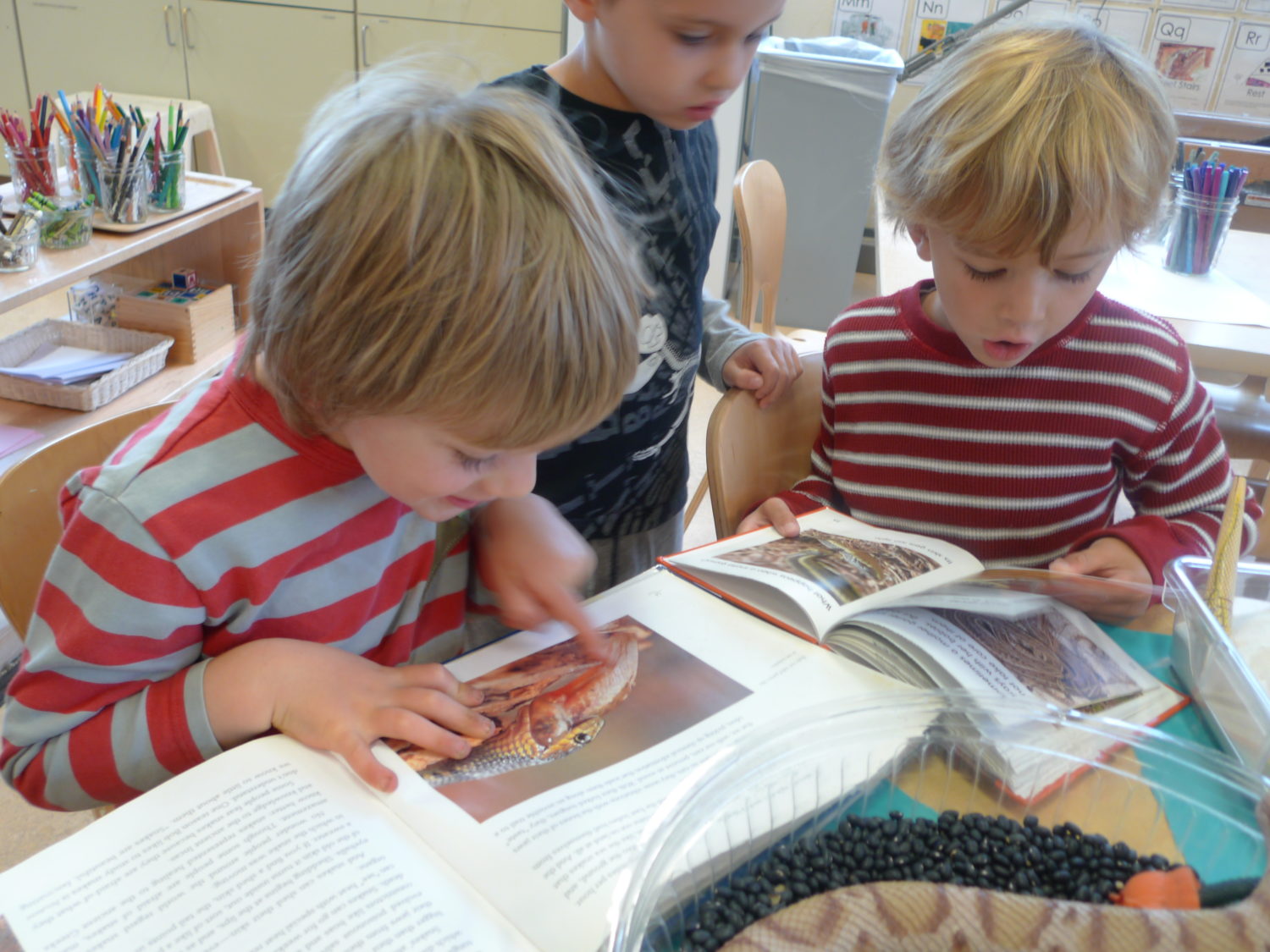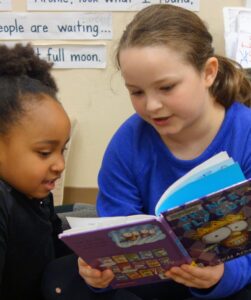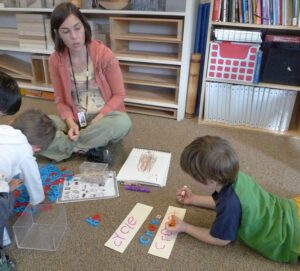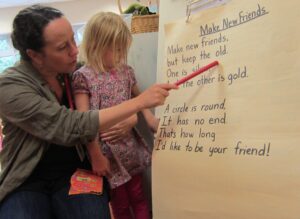Learning to Read the Research on Learning to Read

I have spent many hours during this holiday week in a rabbit hole. Late last week, several parents sent me notes asking for my opinion on recent flare-ups of one of mainstream media’s favorite topics: The Reading Wars. Fair enough, I thought. Why not take the opportunity to look for something I might have missed — find some more recent studies about the learning of reading that I might not have paid enough attention to, check my assumptions and test my bias. I finished my MAT in language and literacy at Lewis and Clark College many years ago now, and though I’ve kept up to date on best practices and been deeply invested in my own ethnographic research practice for all these years — research which has been published in professional journals and books — and withstood the inherent challenges of professional development programming with teachers internationally — I thought this was a good opportunity to see if I’ve missed something. I’m passionate about literacy learning — and so I took this project on with enthusiasm, really eager to learn something new.

 I’ll publish a list of sources I found down in the hole at the end of this post. But I’ll begin with an open call for something I still might have missed. I encourage anyone to send something that is as conclusive as those who shame teachers and teacher educators for not adhering to the “Science of Reading” (they capitalize it!) say it is. One thing I’m pretty sure we all can agree on is how nice it would be to put to bed the issues that sustain this “media-powered moral panic (Gannon and Sawyer, 2007)” that both caused and continues to perpetuate the so-called “Reading Wars”.
I’ll publish a list of sources I found down in the hole at the end of this post. But I’ll begin with an open call for something I still might have missed. I encourage anyone to send something that is as conclusive as those who shame teachers and teacher educators for not adhering to the “Science of Reading” (they capitalize it!) say it is. One thing I’m pretty sure we all can agree on is how nice it would be to put to bed the issues that sustain this “media-powered moral panic (Gannon and Sawyer, 2007)” that both caused and continues to perpetuate the so-called “Reading Wars”.
Through my own research, I have developed a few criteria, based on what I’ve already found, that narrow the search. I am looking for studies that:
- Are not published by researchers (or others) who are also selling curriculum programs
- Can make definitive links between academic research and specific classroom practices that support that research, including children who experience learning differences
- Do not over-simplify the process of reading by over-relying on research that proves its case with the outcomes of standardized tests that over-simplify the process of reading
AND
- Does not base its claims on the report of the National Reading Panel (2000)
If any exist, I can’t find them.
I’ll break this down:
Are not published by researchers (or others) who are also selling curriculum programs
This is obvious, right? Because “effective teaching is caused by effective teachers who focus on children and their needs rather than programs being sold by corporations (Gannon and Sawyer, 2007).” The panic and the noise that comes from outside the classroom and makes teachers so uncertain and fearful of not doing well by the children they care so much about creates low-hanging fruit for those looking to exploit that fear and uncertainty. The booming business of school security is supported by the same kind of panic and fear. Like the most effective teaching, the most effective school safety plan is built on authentic relationships between people who have developed a culture of trust and caring guided by professional adults who know what to pay attention to and have a plan when something goes wrong. But fear and panic tend to make people want easy answers. And easy answers can be sold. Sustaining fear and panic is a lucrative business for those who want to sell you something to fix it with. They have a stake in making sure you stay afraid. Being aware of this leads me to the next:
Can make definitive links between academic research and specific classroom practices that support that research, including children who experience learning differences
There has always been an enormous gap between the kinds of psychological studies academic researchers do in their context and the complex work of the classroom. Developing some kind of “Science of Reading” does not have a direct translation to the work of professional classroom teachers. I’m not an academic researcher, but I can’t see how it ever could. There are no control groups in classrooms. There is only complexity. Research conditions are generally not replicable in classrooms. The sciences adequate to the task of application to classroom practices will embrace the reality of this complexity. Psychological studies of many kinds may inform the work that teachers do – but they’ll never be able to dictate what to do in every case for every child in every classroom. (I know. I just said, “never.”)
Proponents of the “Science of Reading” have needed an antagonist in order to foment the “war” – and “Whole Language” is it. It’s hard to create a lot of panic without a bad guy, and the stories they tell about this bad guy named “Whole Language” are often quite dramatic. I say this because I’ve never actually read anything in which proponents of whole language approaches take a side against phonics. I can’t find this story played out in reverse. What I have heard argued, rather, often goes something like this:
Phonics should not become the dominant component in a reading program, neither in the amount of time devoted to it nor in the significance attached. It is important to evaluate children’s reading competence in many ways, not only by their phonics skills but also by their interest in books and their ability to understand information that is read to them. By emphasizing all of the processes that contribute to growth in reading, teachers will have the best chance of making every child a reader. (pp. 2-96–97)
… which is the conclusion of the National Reading Panel (2000), which brings me to my last two (related) criteria:
Do not over-simplify the process of reading by over-relying on research that proves its case with the outcomes of standardized tests that over-simplify the process of reading
AND
Does not rest its case on the report of the National Reading Panel (2000)
I can’t find a single study cited by proponents of the “Science of Reading” in the last 18 years that doesn’t cite the National Reading Panel’s report. The International Dyslexia Association, for example, takes a strong stance on the need for systematic, explicit phonics instruction in the early grades, insisting that if only teachers would follow a published sequential curriculum, reading struggles would be drastically diminished if not eradicated all together. The International Dyslexia Association cites the NRP report extensively on its Effective Reading Instruction page. The problem here is that the research in the NRP report does not support IDA’s claims (or the claims of any other group that makes use of this report) that programs that sell systematic, explicit, one-size-fits-all phonics or phonemic awareness curriculums are the antidote to all struggles in early literacy development. In fact, the report makes clear: “Phonics should not become the dominant component in a reading program, neither in the amount of time devoted to it nor in the significance attached.” This may be why proponents of phonics first programs have to stir panic, and why academic researchers can’t tolerate the ambiguity inherent to the conclusion of the report. It’s understandable why parents of struggling readers want certainty. It’s understandable why corporations that sell curriculum want fear.

If you want to better understand the problems with the NRP report — I invite you to read the work of others (see Krashen, Yatvin, International Literacy Association, Camili, and Garan) who have summarized and critiqued the report, misreadings, and misuse of the report. Reading these pieces directly will give you a much better picture of the issues than I can in what I intended to be a rather short post. But I’ll give you a little window into some of the most fundamental problems.
This from Joanne Yatvin (2002), one of the panelists who participated in the development of the original report:
Out of the 15 people [panelists who worked alongside Yatvin] appointed, nine were reading researchers, two were university administrators with no background in reading research or practice, one was a teacher- educator, one a certified public accountant (and parent), one was a middle school teacher, and one an elementary principal (me). When one researcher resigned after the first panel meeting, the NICHD [the funders] declined my request that he be replaced by an elementary-level teacher and left that position unfilled. As a result, the panel included no teacher of early reading instruction.…the panel included no teacher of early reading instruction. [I thought that point deserved repeating.]
The science faction of the panel could hardly be considered balanced. All were experimental scientists; all were adherents of the discrete- skills model of reading; and some of them had professional ties to the NICHD. With so many distinguished reading researchers available in the United States, it is difficult to understand why the NICHD could not find one or two involved in descriptive research or with a different philosophy of reading.
TRUE: The panel found no evidence to justify teaching phonics to normally progressing readers past 1st grade.
FALSE: The panel identified phonics as the most important component of reading instruction throughout the elementary grades.
TRUE: The panel made no such determination.
FALSE: The panel’s findings repudiate whole language as an approach to teaching reading.
TRUE: The panel did not investigate whole language as a topic and did not draw any conclusions about it as an approach to teaching reading.
In reviewing its six instructional strategies, however, the panel touched on aspects of reading ordinarily included in whole-language programs (cooperative-learning groups for comprehension, repeated oral reading of texts for fluency) and found that teaching them had positive effects. Furthermore, in four of the phonics studies, the only ones done in regular 1st or 2nd grade classrooms, children taught by a whole-language approach did as well (in one study, better) in overall reading achievement as those taught by phonics only or basals.
FALSE: The panel found research evidence indicating how teachers should be trained to teach reading.
TRUE: The panel found no such evidence.
I was troubled by the fact that it [the study which lead to the NRP report] covered so few of the important issues in teaching reading today, that the ideologies of panel members had governed the choice of most of the topics, and that teachers of beginning reading had been excluded from the entire process. Moreover, I believed that because of its weaknesses, the report was dangerous in its potential for misuse.
If the ongoing battles over reading instruction are any evidence, I’d say she was right to be concerned.

Stephen Krashen’s article in Educational Leadership in 2004, “False Claims About Literacy Development” provides a helpful deconstruction of the actual research studies used to prepare the National Reading Panel’s final report.
So, I’m looking for any studies which do not rely on this report to make claims about “what works” in early literacy. If you find one, please send it my way.
In the meantime, I want to bring forward a couple of things I found helpful.
- Brian Cambourne’s article, “Why Do Some Children Fail to Learn to Read? Okham’s Razor and the Conditions of Learning” published in The Reading Teacher in 2001. (Why Do Some Children Fail to Learn to Read by Brian Cambourne)
Cambourne agrees with Frank Smith, who, in 1983, declared that when the field of education chose to approach an understanding of learning process using a psychological lens, it had likely “backed the wrong horse.” Cambourne argues that it is more appropriate to work at a theory of learning through a biological lens. A psychological lens makes learning look like “a change in an animate organism’s behavior caused by contiguously occurring external factors and events.” We notice a behavior, we change the external factor, we measure the change and the change is called learning. Knowledge, understanding, information, and know-how is stuff that exists independently of a learner. It has to be acquired and stored by the learner and it’s a teacher’s job to transmit the stuff.
In contrast, a biological lens lets us see human learning as a special kind of knowing made possible by constructing meanings using a range of symbol systems. Learning, therefore, cannot be transferred or transmitted by teachers (or anyone else). Learning and knowledge is the end product of a process of meaning making using abstract symbol systems. Language is one code we use to encode meaning, but there are many others. This ability to encode meaning using abstract symbol systems is the unique gift of our species. (Cambourne, 2012)
Using this biological lens, Cambourne created what he calls, “Conditions of Learning”. In the above mentioned article, he uses these Conditions to explain the reasons for failure to learn to read. I’ve attached a PDF of this article (above) to make it easier to get your hands on.
- A study published by the Association for Psychological Science in Psychological Science in the Public Interest in 2018 entitled, “Ending the Reading Wars: Reading Acquisition From Novice to Expert” by Castles, Rastle, and Nation.
The authors of this study end their 40 page report with this statement: In conclusion, the state of the science of learning to read was reviewed comprehensively in this journal more than 15 years ago (Rayner, Foorman, Perfetti, Pesetsky, & Seidenberg, 2001). It is thus surprising and concerning that the reading wars continue. It is our hope that this review will contribute to ending these wars, so that a further examination of the status of this debate 15 years hence will not be required. Given that their conclusion is followed by almost 11 pages of references, I can understand their desire to be done with it. However, given that the most frequently used phrases in their report are things like: “research suggest”, “may have been”, “questions remain”, “further work will be necessary to”, and “might lead to”, I don’t think they found what they were looking for.
Here, they give support for my second criterion, pointing out, “Many outstanding questions remain regarding exactly how phonics instruction is best implemented in the classroom, given that there are, of course, multiple ways in which this could be done (p. 13).” Through all their research and their 40 pages of reporting, and all the media attention this “Reading War” seems to get, no one ever mentions that this is the crux of the actual debate. It’s never been a question of whether to teach phonics — it has always been a question of how best to implement phonics (and any other) instruction in a real live classroom. And anyone that tells you otherwise likely has a program to sell you or is primarily interested in sprinkling the internet with click bait.
And so these years and years and years of psychological study that lead teachers mostly nowhere in their raw form, seem to support Cambourne’s theory that we’re using the wrong frame. Given the article by Castles et al., and the truly substantial work they’ve done most recently, I’d say that not only have we backed the wrong horse by betting on psychology, we’re also barking up the wrong tree. Paying more attention to his Conditions of Learning promises to help us manage the complexity of the relationship between learning, learners, teaching, teachers, experience, and environment present in every classroom. It’s worth a look.
I’ll stop here so that you can do some of your own investigations and thought experiments, and I’ll look forward to returning to these topics soon.
If you are a current Opal School parent, I hope this post puts some context around this week’s Learn and Connect evening meeting. At that meeting, I’ll explain ways that we support conditions for literacy learning at Opal School, and we’ll talk about ways to support at home, too. I look forward to discussing with you!
Selected Sources:
Babes in the Woods: The Wanderings of the National Reading Panel, published in Phi Delta Kappan, by Joanne Yatvin (2002)
Beyond Positivism: Embracing Complexity for Social and Educational Change, published in English Teaching: Practice and Critique, by Patrick Lees (2007)
Beyond Smoke and Mirrors: A Critique of the National Reading Panel Report on Phonics, published in Phi Delta Kappan, by Elaine Garan (2001)
Conditions of Literacy Learning: Towards an Ecologically-Valid, Scientifically Rigorous, Theory of Learning-To-Read, presentation by Brian Cambourne (2012)
Ending the Reading Wars: Reading Acquisition From Novice to Expert, by Castles, Rastle, and Nation (2018)
Everybody’s Selling It — But Just What Is Explicit, Systematic Phonics Instruction?, published in The Reading Teacher, by Mesmer and Griffith (2005)
False Claims About Literacy Development, published in Educational Leadership, by Stephen Krashen, (2004)
From Conditions of Learning to Conditions of Teaching, published in The Reading Teacher, by Brian Cambourne (2001-2)
How Much Evidence is Enough, published in The Journal of Reading Recovery, by Richard Allington (2005)
Inside the Business of School Security to Stop Active Shooters, by Lakshmi Singh (November, 2018)
I Told You So! The Misinterpretation and Misuse of the National Reading Panel Report, published on Education Week, by Joanne Yatvin (2003)
NAEYC and International Reading Association Position Statement on Learning to Read and Write English (1998)
Our Schools are Not Broken: The Problem is Poverty, commencement address by Stephen Krashen, Graduate School of Education and Counseling, Lewis and Clark College (2011)
Research Advisory Addendum: Dyslexia, Response to the International Dyslexia Association, published by the International Literacy Association (2016)
Research Advisory: Dyslexia, published by the International Literacy Association (2016)
Teaching Children to Read: The Fragile Link Between Science and Federal Education Policy, published in Education Policy Analysis Archives, by Camilli, Vargas, and Yurecko (2003)
The Case Against Intensive Phonics Instruction, by Stephen Krashen (2018)
Where We Stand on Learning to Read and Write, by the National Association for the Education of Young Children and the International Reading Association (2009)
Whole Language and Moral Panic, published by International Journal of Progressive Education, by Gannon and Sawyer (2007)
Whole Language and the Great Plummet of 1987-92: An Urban Legend from California, published by Phi Delta Kappan, by Stephen Krashen (2002)
Where Has the Joy of Writing Gone and How Do We Get it Back for Our Children?, published on The Conversation, by Creely and Diamond
Why Choice Matters to Student Learning, by Heather Wolpert-Gawron (November, 2018)
Why Do Some Students Fail to Learn to Read? Ockham’s Razor and the Conditions of Learning, published in The Reading Teacher, by Brian Cambourne (2001)
